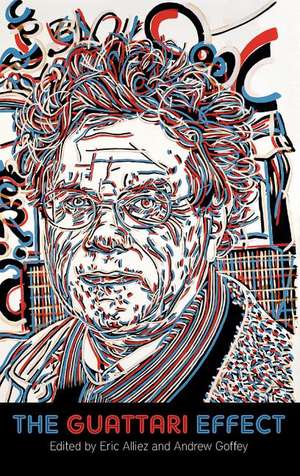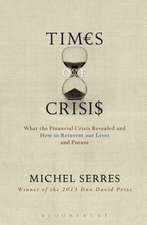The Guattari Effect
Editat de Professor Eric Alliez, Dr Andrew Goffeyen Limba Engleză Paperback – 29 iun 2011
| Toate formatele și edițiile | Preț | Express |
|---|---|---|
| Paperback (1) | 269.41 lei 6-8 săpt. | |
| Bloomsbury Publishing – 29 iun 2011 | 269.41 lei 6-8 săpt. | |
| Hardback (1) | 954.05 lei 6-8 săpt. | |
| Bloomsbury Publishing – 29 iun 2011 | 954.05 lei 6-8 săpt. |
Preț: 269.41 lei
Preț vechi: 342.43 lei
-21% Nou
Puncte Express: 404
Preț estimativ în valută:
51.55€ • 53.96$ • 42.91£
51.55€ • 53.96$ • 42.91£
Carte tipărită la comandă
Livrare economică 31 martie-14 aprilie
Preluare comenzi: 021 569.72.76
Specificații
ISBN-13: 9781441121974
ISBN-10: 1441121978
Pagini: 320
Ilustrații: 1
Dimensiuni: 156 x 234 x 19 mm
Greutate: 0.63 kg
Ediția:New.
Editura: Bloomsbury Publishing
Colecția Continuum
Locul publicării:London, United Kingdom
ISBN-10: 1441121978
Pagini: 320
Ilustrații: 1
Dimensiuni: 156 x 234 x 19 mm
Greutate: 0.63 kg
Ediția:New.
Editura: Bloomsbury Publishing
Colecția Continuum
Locul publicării:London, United Kingdom
Caracteristici
Includes original black and white illustrations by the artists Gerard Fromanger and Ernesto Neto.
Notă biografică
Eric Alliez is Professor of Philosophy at the Centre for Research in Modern European Philosophy at Kingston University, UK. His publications include Capital Times (translated by G. Abbeele, University of Minnesota Press, 1996).
Andrew Goffey is Senior Lecturer in Media, Culture and Communications at Middlesex University, UK.
Cuprins
Introduction \ Part 1 Sorties \ Chapter 1: The SchizoChaosmosis (1991) Félix Guattari \ Chapter 2: The Vertigo of Immanence Interview with John Johnston, June 1992, Félix Guattari \ Chapter 3: OnContemporary Art Interview with OliverZahm, April 1992,Félix Guattari \ Part 2 Critical and Clinical Protocols\ Chapter 4: Analysis, between Psycho and Schizo Jean-Claude Polack \ Chapter5: The Deterritorializsd Unconscious Peter Pál Pelbart \ Chapter 6: Mapsand Refrains of the Rainbow Panther Anne Querrien \ Chapter 7: Guattariand Anthropology: Existential Territories Among Indigenous Australians BarbaraGlowczewski \ Part 3 Social and Political Connections \ Chapter 8:Guattari's Contributions to the Theory of Semiocapitalism Gary Genosko \Chapter 9: Relaying a War Machine? Isabelle Stengers \ Chapter 10:Gilles-felix Antonio Negri \ Chapter 11: A Schizoanalytical Knight onthe Chessboard of Politics Anne Sauvagnargues \ Chapter 12: Repression,Expression, Depression Franco 'Bifo' Berardi \ Part 4Ethico-aesthetic Effects \ Chapter 13: From Aesthetic Autonomy toAutonomist Aesthetics: Art and Life in Guattari Stephen Zepke \ Chapter14: Going to the Cinema with Félix Guattari and Daniel Stern Raymond Bellour\ Chapter 15: Nothing is EstablishedForever Pascale Criton \ Chapter 16: Félix Portraits 2010 Annie Ratti\ Conclusion : The Guattari-Deleuze Effect Éric Alliez \ Contributors \ Bibliography\ Index
Recenzii
Author article in Radical Philosophy, Issue 169
The contributors-Éric Alliez, Andrew Goffey, Jean-Claude Polack, Peter Pál Pel-bart, Anne Querrien, Barbara Glowczewski, Gary Genosko, Isabelle Stengers, Antonio Negri, Anne Sauvagnargues, Franco 'Bifo' Beradi, Stephen Zepke, Raymond Bellour, Pascale Criton, Annie Ratti, as well as Guattari himself form a "collective assemblage of enuncia-tion" that re-animates the Guattarian corpus for a new generation...What can keep desire on a trajectory that will lead it beyond the plane of exploitation and commodification? What form(s) of desire should be de-sired? Looking to (looking at) Guattari is one way to begin to theoretically answer these questions. This perhaps simple point is literally and materially rendered in the pages of Ratti's photo-art essay. The silence of these images speaks of what remains, and is yet to be said, in the name and in the spirit of Guattari. This is perhaps finally the most significant effect of Guattari's thought today: it spurs the desire to look again at Guattari's life, work, and legacy. The generosity of his texts invite us 'to come back to it, not so as to conclude, but to start again.' (Alliez, 260)
A strange effect of The Guattari Effect is that it slows down the reader. This machine-text does not whiz along as does the maddening velocity of Anti-Oedipus or A Thousand Plateaus. The volume takes time for remembering, reflecting, but also for extending and enriching the work, multiplying the effects, for what was, and still could be, Guattari. This involves-as the volume demonstrates-far more than "close reading." It tries to think how new subjectivities, new modes of living and resisting, come, and can come, into existence. It rides the wave of Guattari's enunciation beyond the text to what gives (or gave) life to it. It directs us beyond the classroom, beyond the lecture hall, out, perhaps even into the streets.
The contributors-Éric Alliez, Andrew Goffey, Jean-Claude Polack, Peter Pál Pel-bart, Anne Querrien, Barbara Glowczewski, Gary Genosko, Isabelle Stengers, Antonio Negri, Anne Sauvagnargues, Franco 'Bifo' Beradi, Stephen Zepke, Raymond Bellour, Pascale Criton, Annie Ratti, as well as Guattari himself form a "collective assemblage of enuncia-tion" that re-animates the Guattarian corpus for a new generation...What can keep desire on a trajectory that will lead it beyond the plane of exploitation and commodification? What form(s) of desire should be de-sired? Looking to (looking at) Guattari is one way to begin to theoretically answer these questions. This perhaps simple point is literally and materially rendered in the pages of Ratti's photo-art essay. The silence of these images speaks of what remains, and is yet to be said, in the name and in the spirit of Guattari. This is perhaps finally the most significant effect of Guattari's thought today: it spurs the desire to look again at Guattari's life, work, and legacy. The generosity of his texts invite us 'to come back to it, not so as to conclude, but to start again.' (Alliez, 260)
A strange effect of The Guattari Effect is that it slows down the reader. This machine-text does not whiz along as does the maddening velocity of Anti-Oedipus or A Thousand Plateaus. The volume takes time for remembering, reflecting, but also for extending and enriching the work, multiplying the effects, for what was, and still could be, Guattari. This involves-as the volume demonstrates-far more than "close reading." It tries to think how new subjectivities, new modes of living and resisting, come, and can come, into existence. It rides the wave of Guattari's enunciation beyond the text to what gives (or gave) life to it. It directs us beyond the classroom, beyond the lecture hall, out, perhaps even into the streets.




























